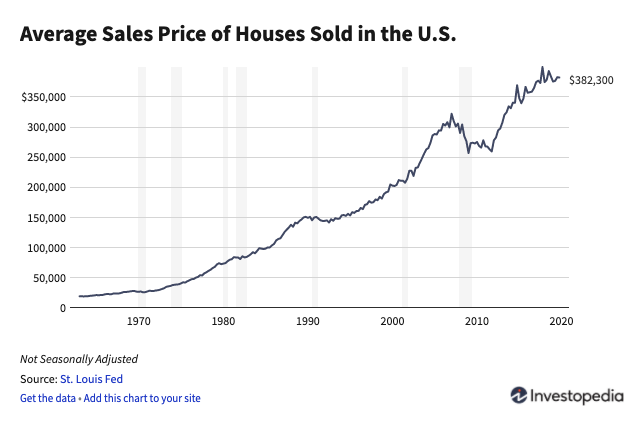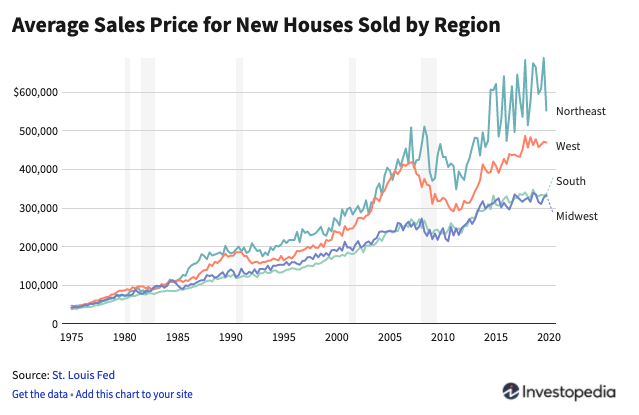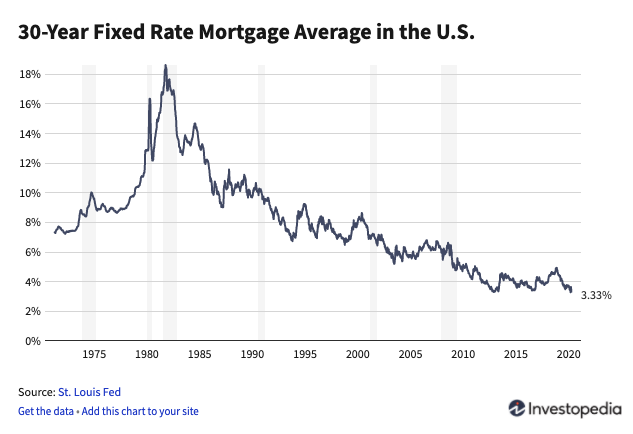
JEAN FOLGER
April 23, 2020
Real estate has traditionally been considered a safe investment. But recessions and other disasters (like the COVID-19 pandemic) can test that theory—and make investors and would-be homeowners think twice.
KEY TAKEAWAYS
- Home values tend to rise over time, but recessions and other disasters can lead to lower prices.
- Following slumps, home values can increase in some areas of the country because of strong demand and low supply, while other areas struggle to rebound.
- Potential homebuyers shouldn't focus on national trends, as prices vary between states and even neighboring cities.
- Low mortgage rates have an indirect effect on home prices, as consumers are willing to take on more debt when credit is cheap.

Historical Prices
Prior to 2007, historical housing price data seemed to indicate that real estate prices could continue to rise indefinitely. In fact, with few exceptions, the average sale price of homes sold in the U.S. climbed steadily each year from 1963 to 2007—when the housing bubble burst and the financial crisis of 2008 ensued.

Rebound after the Financial Crisis
By 2013, the average sales price of homes sold in the U.S. had rebounded to pre-crisis levels. For the next several years, the uptrend looked promising, until 2018 when prices flattened, and then began to fall slightly in 2019.
Of course, real estate prices depend heavily on the market (location, location, location), and national trends can tell only part of the picture. A boom in California can mask a bust in Detroit.
Even within the same city, numbers can vary widely. Areas that experience new growth or gentrification can show significant price appreciation, while areas across town can be in decline. The chart below shows how the south, west, northwest, and midwest regions experience different trends in real estate prices.

When looking at the national and regional statistics, be sure to account for the reality of the market in your local area. Rising prices at the national level may not help you if your city, state or neighborhood is in decline.
Home Prices in 2020
It's too soon to tell what will happen to home prices in 2020. But if history repeats itself, we can expect a drop in home prices as a result of the COVID-19 recession. As of late March, purchase contracts have started to fall through amid mortgage troubles, a lack of buyer interest, and even lack of appraisers and other professionals needed to execute transactions.
At the same time, potential construction changes and delays have become a very real concern. Again, it's too soon to know what will happen, but it's possible that new starts and renovations will take a hit for at least part of 2020.
Home Trends
Of course, it's important to consider that factors other than supply and demand can affect real estate prices. For example, even before the numbers began to go the wrong way in 2008, the National Association of Home Builders reported that the average home size in America was 983 square feet in 1950, 1,500 square feet in 1970, and 2,349 square feet in 2004.
This trend continued in the first half of the 2000s, after which it began to decline somewhat. Still, with homes getting bigger and inflation adding to the cost of building materials, it is only logical that home prices would rise. Other trends can drive prices up, too, such as buyer preferences for more expensive flooring, appliances, fixtures, and the like.
Numbers and Trends
National trends may not give you the whole picture, as real estate values and prices vary between states and neighboring cities.
Homes as Investments
Because home prices tend to rise over time, buying a home has traditionally been viewed as a safe investment. Still, an important point to consider when looking at a home as an investment is that it won't ever pay off unless you sell it.
From a practical standpoint, even if your primary residence doubles in value, it probably just means that your real estate taxes have gone up. All of the gains you experience are on paper until you sell the property. Of course, for many homeowners, that's OK. A home that doubles in value is a nice asset to pass on to the kids and grandchildren.
Downsizing
If you decide to sell and buy another home in the same area, remember that the prices of those other homes have probably risen, too. To truly book a gain from your sale, you will likely need to move to a smaller home in the same area, or move out of the area and find a less expensive place to live.
Of course, downsizing is an attractive option for many empty nesters and retirees. Aside from the potential financial gains, a smaller home is easier to take care of (at least in theory), and it can address future mobility issues.
Home Equity Loans
While it is possible to tap the equity in your home by taking out a loan against it, using your house as an ATM is not always a good strategy. Not only does the interest you pay eat into your profits, but the loan payment takes away from your financial stability. If real estate prices decline, you may find yourself in the unenviable position of owing more on the loan than the house is worth.
Mortgage Rates
Mortgage rates generally rise during periods of economic growth. When this happens, the job market is healthy and people's wages rise, too. Conversely, mortgage rates tend to fall during economic slowdowns as the Fed tries to make it easier to spend and borrow.
The average 30-year fixed-rate mortgage rate has been below 5% since 2010 (keep in mind that even tiny changes in rates can have a huge impact on the overall cost of your home). This chart from the Federal Reserve Bank of St. Louis shows historical prices for 30-year fixed-rate mortgages, starting in 1971.

So how does this play out for real estate prices? Lower mortgage rates don't necessarily have a direct relationship to home prices, even though we'd like to think they do. But they may have an indirect effect on them. When rates are low, consumers are more willing and can afford to take on more debt. That's because the cost of credit—i.e. interest—is cheap. Rising interest rates, though, tends to lead to weaker demand from buyers.
Is Buying a Home a Good Investment?
The idea that a home is a good investment stems from the fact that real estate prices tend to rise, at least historically speaking. Since there's no way to predict the future real estate market, it's important to avoid getting in over your head. A home is a good investment only if you can afford it.
Of course, while you are unlikely to see any profits that you can spend if you plan to live in the same house all of your life (think: house rich, cash poor). But if you buy with an exit strategy in mind, there is a much better chance of realizing a cash profit.
First, consider your motivation for buying a home. If you want to live in it, then you probably don't need to think about your home in terms of profits and losses. If you're hoping to make money, then you need to enter the transaction with an exit strategy. This also means you should have a selling price in the back of your mind, all while keeping the purchase price of the property at the forefront.
When the market reaches your price point, you sell the property just as you would a stock that has appreciated. This may not be a practical approach for your primary residence, depending on your lifestyle, but it is exactly what many real estate investors do when they purchase properties—renovate and sell them. Just remember that prices don't always move up.
The Bottom Line
With history as a guide, most would-be homeowners would do well to buy a place they actually hope to inhabit, pay off the mortgage quickly, live there until retirement, then downsize and move to a less expensive home. It's not a sure bet, but this strategy does increase the likelihood of making a profit.



